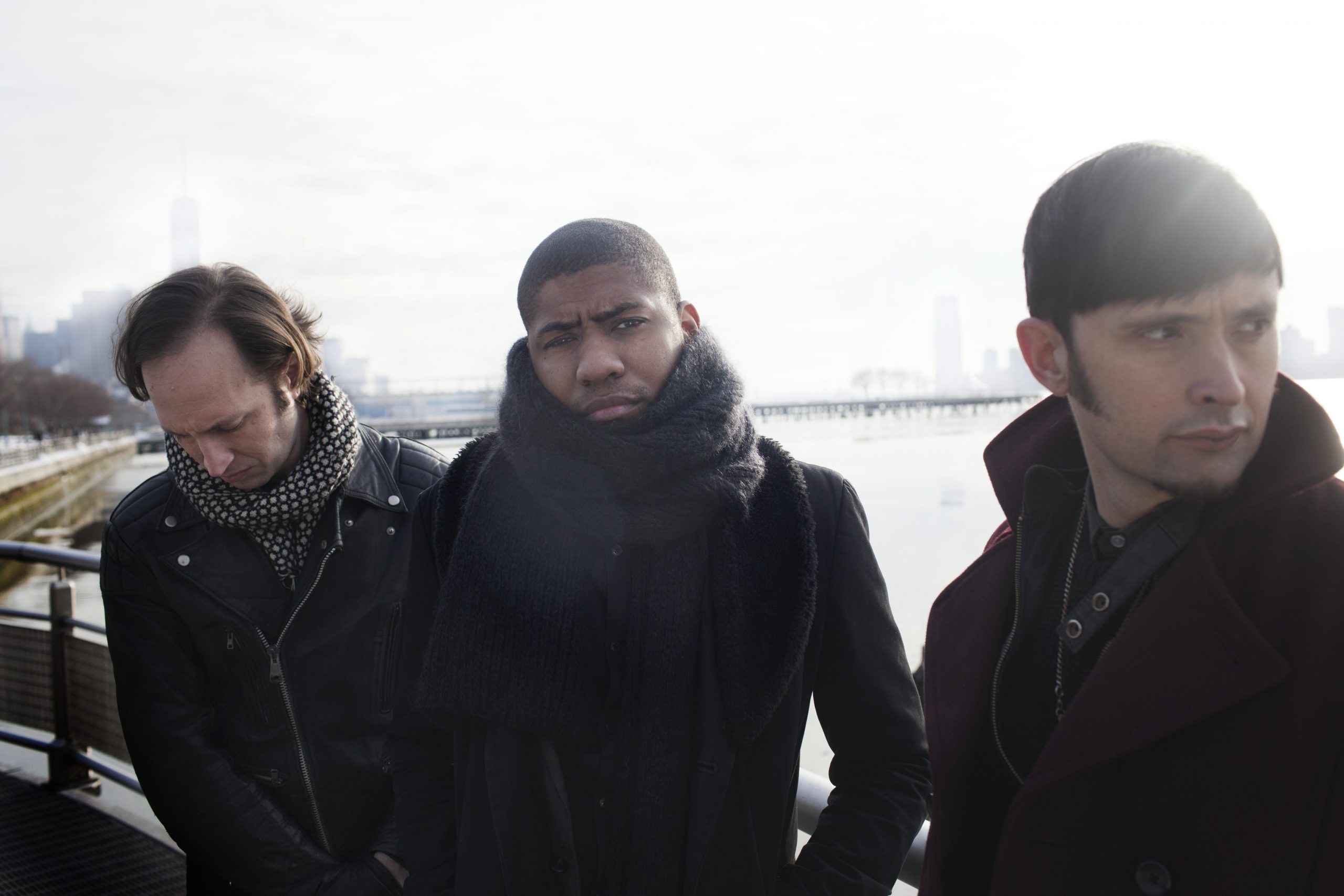Listening to Algiers is like cramming a Marxist treatise in one ear and a church organ in the other. Their music is a heady, vicious condemnation of bankrupt culture, ghosted gospel punk that snarls at the status quo. The text of their debut, self-titled album is a scathing intellectual clash of religion, race, economics and morality. To grapple with the eleven songs on Algiers is to wrestle angels, face down demons and rebel against authority -- this is revolutionary music in the truest sense of the word. It demands action. It requires penance. It destroys expectations.
Algiers is vocalist/guitarist Franklin James Fisher, bassist Ryan Mahan and guitarist Lee Tesche (although they all share programming and percussion roles), who formed lifelong bonds growing up disillusioned and discontent in Atlanta, Georgia. Mahan and Tesche were in avid pursuit of post-punk ideals when Fisher, a child of the gospel tradition, stumbled upon them. Together, the three began an interactive dialogue that naturally morphed into a creative extension of their conversations. First and foremost, their music is influenced by their connection to the American south, or rather, a reaction to the dredges of political and social tensions in that culture. Mahan explains that their initial connection was sparked by a similar sense of frustration with Southern hegemony.
"There's a big cultural marker hanging over our heads -- the South," Mahan said. "When you're immersed in that culture you have a blinded view and you kind of buy into those ideas. It's a very repressed, conservative society that has a very underlying sense of dread and violence. How we connected initially as individuals and on an aesthetic level, was in reaction to that type of experience and that type of life-world. So before music comes into play -- and obviously music is one of the mental influences on a person's outlook and ideology -- it's really important for us to acknowledge that we started to communicate in a very reactive and political way about that history and origin story. We were always individuals that were looking from the outside into these spaces, in terms of music scenes, in terms of art scenes, in terms of politics. Before we could even talk about music, that's really fundamentally important."
[videoembed size="full_width" alignment="center"][/videoembed]
Even a cursory listen to the gospel spook of their first single "But She Was Not Flying" reveals these underlying political tenets; as does their beautifully-curated Tumblr, a kaleidoscope of punk and protest art that influences and inspires further conversation among themselves and others. Early video "Blood" evokes a similar political collage. But as children of the south, the specter of the church also looms over this record, another divisive topic that they revisit again and again in their music.
"We have a couple of ongoing themes and one is religion," Fisher said. "All of us are from the deep South but we have very different relationships to religion. Historically for African Americans, the church is the one place where you could go to be free and open. All the way up, even the civil rights movement was centered in the church. It's a form of identity and I embrace it. Ryan and I have this ongoing debate where he's open and totally honest with me about faith. He comes from this agnostic side where he really wants to have access to that faith, but he's unable to for reasons X, Y, Z, and this is a dialogue that we perpetuate. It's like that Flannery O'Connor quote 'the South is hardly Christ-centered, it is most certainly Christ-haunted.' That's always going to be a part of anything that we do."
Mahan and Tesche currently live in London, and Fisher, New York, and though they reunited to record the album, the group mostly functions cross-continentally, a feat in itself. This sense of dislocation inhabits Algiers, which was composed mostly in solitary bits sent back and forth over email. But this is not an album or a band that came together easily. Over the course of about a decade, all three members left Atlanta to pursue graduate degrees overseas. Fisher studied comparative literature (his thesis, unsurprisingly, examined postmodern dystopian literature), Mahan comparative politics, and Tesche graphic design. Armed with these respective backgrounds in vastly different areas, they had the tools to establish their artistic presence online. Given the distance between them, the website functioned as a home for the band and their dialogue. But it took time to chisel at the enormous topics they tackle in a way that felt authentic.
[videoembed size="full_width" alignment="center"][/videoembed]
"There are a few songs that Nina Simone did (namely "Mississippi Goddamn" and "Sinnerman") that capture so perfectly a punk rock energy, but also the rebellious energy and the really political energy we have," Mahan said. "These feelings of disaffection and alienation that spring from being immersed in what we perceived as a hegemonic culture at that time, that really brought us together. We needed to channel those ghosts, those forgotten moments in musical forms and political forms, into something new. Obviously, it's very difficult to easily develop that because it could become some form of mimicry, but it's actually very much connected to our growth as individuals, our growth in thinking and all that."
After indie giant Matador stumbled upon their website and early singles, the trio signed with the label in January of 2014. Fisher flew to London and they spent most of last year recording Algiers at 4AD studios. Now, they are on the cusp of releasing their debut at the beginning of June and embarking on a tour opening for Interpol. Bloc Party drummer Matt Tong will play drums for them during this tour -- percussion on the recorded songs is generally provided by all three stomping, clapping and otherwise making a beat. The rhythms in particular add an intensity to their music, drawing on everything from the D.C. hardcore scene, to no wave, post-punk energy and traditional gospel and soul tempos.
"It always seemed quite natural to us to connect genres like punk and gospel," Tesche said. "There's always been this overlap between Nina Simone and a band like The Make-Up (that sprang from Nation Of Ulysses). When I was a teenager I spent a lot of time really really into DC hardcore scene, and there's just as much a congregational feel to their shows and even just protest music in general. From Public Enemy to Fela to Suicide or MC5. There's a lot of things that have a common link and overlap and all come from this punk rock place. But all of that music points toward a gap, an opening, a crack in the spectacle. We're trying to find that little opening. It's difficult, but that's what we've been working toward."
[videoembed size="full_width" alignment="center"][/videoembed]
//
Algiers is out 6/2 via Matador.
Spring tour dates with Interpol:
04/18 Paris, FR @ Record Store Day – Rough Trade On Tour, Point Éphémère,
04/22 London, UK @ Power Lunches
05/07 Richmond VA @ The National
05/08 Raleigh NC @ The Ritz
05/11 St. Louis MO @ The Pageant
05/12 Indianapolis IN @ Egyptian Room at Old National Centre
05/13 Detroit MI @ The Fillmore
05/15 Cincinatti, OH @ Bogarts
05/16 Pittsburgh PA @ Stage AE






